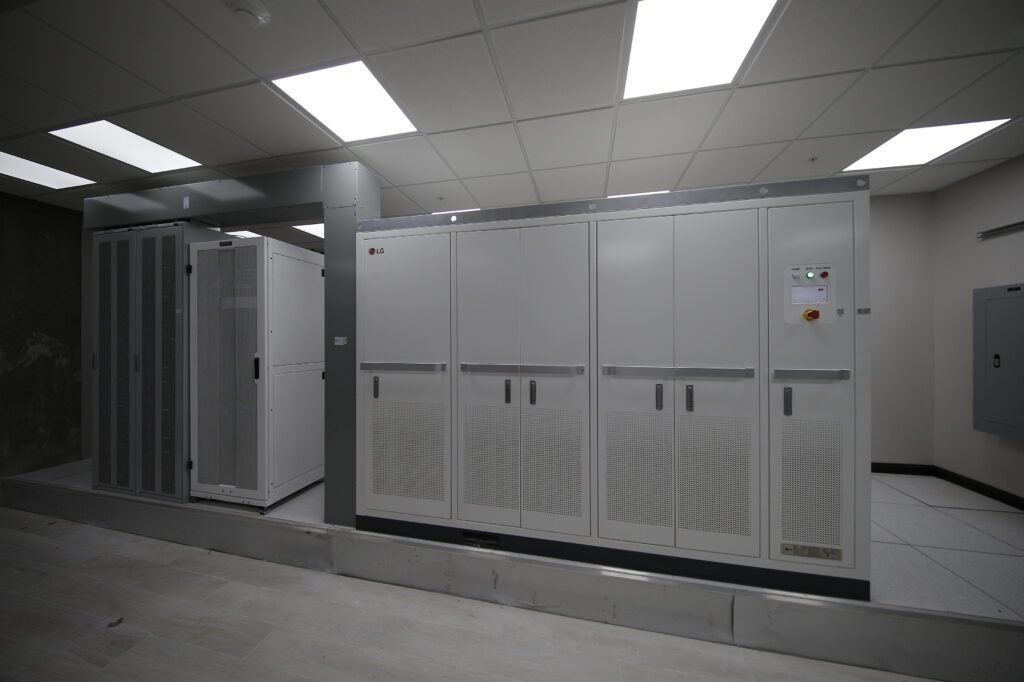Historic Texas Hotel Adds Energy Storage to Replace Diesel
The Sinclair Hotel in Fort Worth, Texas, is known as the “world’s first all-digital hotel.” Built in 1930, the building initially served as the headquarters for The Sinclair Oil Company. However, the hotel (Figure 1) has deviated widely from its rich history in fossil fuels, using power-over-ethernet technology, digital electricity, and energy-conserving diesel replacement technology to cut utility costs. The Marriott Autograph Collection property is now recognized as a hallmark of sustainable hospitality and innovation.
As power outages become more common, businesses fortunately have options regarding what form of backup power generation they want to use. The decision often boils down to cost, the location of the system in the building, and the amount of energy needed for operation. According to Energy Star, the federal government energy efficiency program, hotels on average spend $2,196 per available room annually on energy—representing about 6% of all property operating costs. The Sinclair has 164 boutique rooms, meaning the hotel requires about $360,000 of energy annually to operate. Finding a reliable system that supported The Sinclair’s vision was necessary in the state with the third-highest number of power outages nationwide.

The hotel’s demand for electricity must be satisfied, other operations become difficult, impacting everything from the room reservation system to elevators, the property’s restaurants and bars, and more. As part of maintaining the building roots in the fossil fuel industry, initial plans for the hotel included having a diesel generator in the basement. However, this created a problem as the proposed machinery was located next to one of the hotel’s dining facilities. Diesel generators use fossil fuels and therefore need significant amounts of ventilation. And they are noisy, not what you want next to a high-end restaurant.
Additionally, diesel generators clashed with the hotel’s aesthetic and would be a hefty investment for Farukh Aslam, CEO of Sinclair Digital. Diesel generators require frequent maintenance and performance checks to ensure the system is operational during a power outage. The National Renewable Energy Lab (NREL) reports that diesel generators are slightly less dependable when compared to other types of generators. For these reasons, Aslam was reluctant to install one at The Sinclair.
“At another property I own, the diesel generator stopped working on day one of an extended power outage, and we couldn’t get the fuel tank refilled for five days due to icy roads,” Aslam said. “Diesel generators are loud, noisy, and can emit harmful CO2 gas. I needed something both durable and sustainable.”
After working with LG Electronics USA on OLED televisions at the property, and the hotel’s heating, ventilation, and air conditioning systems, Aslam turned to the team for guidance. With no existing solution on the market, this conversation resulted in the installation of the world’s first UL924 lithium-ion energy storage system (ESS) (Figure 2) to back up all emergency systems at the hotel, including lighting, elevators, and stairway pressurization.

Energy storage systems do what they sound like—store energy for later use during a power outage. Using either a solar system or the electrical grid, the batteries charge and conserve energy, turning on automatically when a power failure occurs. However, ESS can do more than just provide backup power during an outage. Known as peak shaving, energy storage systems can automatically switch on during hours of operation when utility prices are the highest, known as time-of-use rates. Since all hotels are operational 24/7, this is highly beneficial.
The Sinclair does not have a solar power system and relies on the grid for energy, though it could add solar at a later date. With only an ESS available during an extended outage, operations would become limited, and the battery would eventually empty. To forestall this as long as possible, Aslam installed a DC microgrid that can both minimize and prioritize the use of the available stored energy.
The ESS at the Sinclair serves as an interface between the grid and the microgrid. It is a backstop, isolating any variances that may occur between the two. Therefore, it acts as a buffer, providing stable, reliable power at all times.
As Aslam learned, traditional diesel generators require frequent maintenance and performance checks to prevent system failure during a power outage. On a genset diesel generator, the air filter, oil and coolant levels, block heater, radiator, exhaust system, and batteries all demand consistent monitoring to avoid blockage, leaks, and other performance hindrances. Generators also require frequent load bank testing to ensure the system is operational during a grid outage.
When a diesel engine generator does not operate under load, it is prone to building up unburned fuel and soot in the exhaust system, so-called “wet stacking.” According to NREL, backup generators are not intended for continuous operation, and diesel generators have high operating costs compared to typical grid prices.
Unlike a generator, maintenance for ESS is minimal. If used for peak shaving, frequent run tests are not necessary. The only ongoing maintenance required for a commercial ESS is replacing air filters annually and inspecting the tightness of cable lugs on a rotating basis.
Installing the ESS, DC microgrid, and other sustainable technology at The Sinclair resulted in an Energy Star rating of 70, a whopping 20 points higher than the median hotel score. Aslam likes the idea of energy storage so much that he has now installed a residential ESS in his home.
“ESS is the future for buildings,” Aslam said. “ESS is gaining attention as a green energy solution and we’re seeing improvements in pricing, safety, density and technology seemingly every day.”
—Ruben Willmarth is senior sales engineer for commercial ESS at LG Electronics USA.